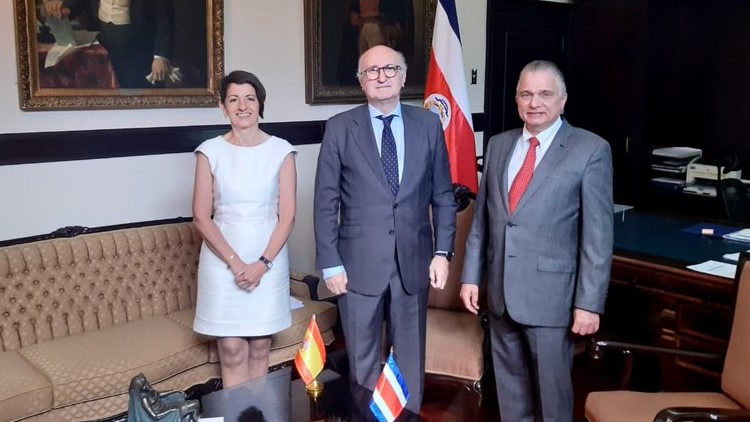The Diplomat
Venezuela’s Minister of Foreign Affairs, Yván Gil, held a meeting this week with Spain’s ambassador to Caracas, Ramón Santos Martínez, to “strengthen cooperation ties,” according to the Bolivarian regime. Santos is the first Spanish ambassador to Venezuela since November 2020, when Jesús Silva ceased, and his recent arrival in Caracas is framed in the current process of diplomatic détente after the resumption of the dialogue between the opposition and the government of Nicolás Maduro.
“Productive meeting with the ambassador of Spain in our country, Ramón Santos Martínez, with whom we traced lines of work in order to strengthen matters of bilateral and multilateral interest in the Ibero-American scenario, as instructed by our President Nicolás Maduro,” Gil stated through his social networks. The meeting took place this past Wednesday.
Ramón Santos Martínez was appointed ambassador of Spain to Venezuela last December 27 and presented his credentials to Maduro on January 24. Until then, Santos had held the post of Chargé d’Affaires in Venezuela since November 2021, one year after Silva’s departure and replacing Juan Fernández Trigo, current Secretary of State for Ibero-America and Spanish in the World.
Spain had no ambassador, with that rank, in Caracas since November 2020, when it decided to downgrade its diplomatic representation in Venezuela to the level of Chargé d’Affaires with Cabinet Letters, a figure of a lower echelon with which it is shown that relations between the two countries are not fully satisfactory. Several European Union countries accredited in Caracas did the same to express disagreement with the way the Bolivarian regime organized the last presidential elections, held in 2018.
Venezuela’s representation in Spain also remained at the level of Chargé d’Affaires throughout this time. In early December, the Government of Nicolás Maduro appointed Coromoto Godoy Calderón to this position in Madrid, replacing Mauricio Rodríguez Gelfenstein, who had been in charge of the Embassy since February 2018, following the departure of Ambassador Mario Isea. Finally, Coromoto Godoy presented last January 23 the Style Copies of her Letters of Credence at the Ministry of Foreign Affairs, a few dates after the National Assembly, controlled by the Bolivarian regime, ratified her appointment as ambassador.
According to what Foreign Ministry sources informed The Diplomat at the time, the appointment of Ramón Santos is justified by the “new circumstances that make it advisable to raise again the representation of Spain in Venezuela to the level of ambassador”. Specifically, it was taken into account the recent resumption of the dialogue in Mexico between the Government and the opposition, which had been stalled for more than a year and which has resulted in “a humanitarian agreement whereby 3 billion dollars will be allocated to improve the conditions of the Venezuelan people”, which “implies that there is an objective improvement in the situation that should be supported by Spain with an appropriate dialogue and at the highest level to interact with both parties”.
Likewise, the fact that some members of the European Union (among them, France and Portugal) have also decided to maintain their representation at the ambassadorial level was also valued. “In the current scenario, Spain cannot see its possibilities of action diminished with respect to other European partners”, the sources specified. Along the same lines, and once the negotiations in Mexico have resumed, Spain “intends to be able to influence, with an adequate level of representation, the opening of the Venezuelan political process”. In this regard, the sources warned that this decision does not imply that Spain has changed “its critical judgment on the 2018 elections”, but that “it seeks that the elections of 2024 be more democratic and allow the opposition to play the role that at the time it could not exercise”.
On the other hand, Spain is one of the countries with the greatest interests in Venezuela (political, economic, energy or consular), “which requires a particularly appropriate level of interlocution at times when important decisions are being made”. In this sense, “the fact that Spain has more than 160,000 nationals in Venezuela, which are necessarily affected by the sanctions, or that the exploitation of Venezuela’s energy resources may be reopened to foreign companies, requires the strengthening of Spain’s official presence”.







